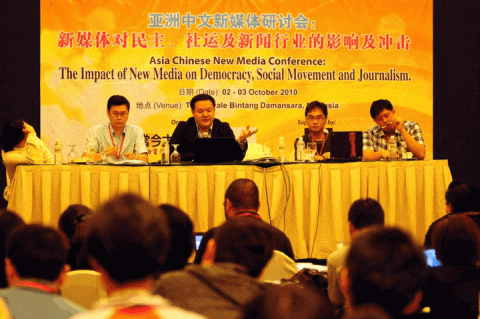
Over the past weekend (2-3 October 2010) in Kuala Lumpur a conference featuring over 100 active participants in new media gathered in Kuala Lumpur to share local media dynamics, their views on freedom of the press and individual expression and the impacts of new and social media on their work.
The Asia China New Media Conference, hosted by MalaysiaKini’s Chinese Service and sponsored by Open Society Institute and the University of Hong Kong’s Center for Journalism and Media Studies, gathered over one hundred journalists, bloggers and academics to discuss the current state of new media in Chinese-speaking Asia as well as to discuss future areas for cooperation. Attendees came from China, Taiwan, Hong Kong, Macao, Singapore and the host country Malaysia.
For me the conference highlighted multiple themes that are influencing new media around the world. I think any one of the themes would justify a blog post, and will offer tremendous amount of future material to blog from. This morning I will try to capture a few key themes as I heard them and themes that I plan to develop more in the coming days and weeks.
The Conference began with a series of panel discussions on the local media situation in each region. Given the breadth of the attendees several clear distinctions existed. First, there were regions like Taiwan, Hong Kong and Macao where media is relatively free; but has been “corrupted” because of a need to maintain commercial viability. Two examples of new media reaction to this environment participated in the conference and led important parts of the discussion around objectivity and the role of activism and the organization in online news - Taiwan’s Coolloud (www.coolloud.org.tw - 苦劳网) and Hong Kong’s InmediaHK (www.inmediahk.net - 香港独立媒体网).
Second type of media environment represented were regions where government restrictions on freedom of the press and expression limited the space in which new media could develop and operate. Malaysia and Singapore represented examples of this approach. In both cases independent media have some limited legal room to develop, but are carefully monitored and managed. Representatives attending from these regions included host MalaysiaKini.com (www.malaysiakini.com - 当今大马), Malaysia’s Merdeka Review (www.merdekareview.com - 独立新闻在线) and Singapore’s Online Citizen 网上公民 .
China represented the third region where comprehensive government surveillance and censorship allowed virtually no space for new media organizations, leaving an interesting symbiosis between individual media players – bloggers and microbloggers – and traditional media.
One of the most interesting sessions of the conference was a panel discussion in which bloggers and mainstream media from China discussed the development of independent reporting and the relationship between mainstream media and independent online “reporters”. Independent reporters often identify a story and create a reporting thread through live reports, using microblogging platforms like Sina Micro or Twitter. This “cooperation” highlighted two things for someone with recent experience in the US media market. One, the level of innovation and risk-taking that mainstream Chinese journalists take in covering stories. Media in the US and Europe spend a lot of time discussing Chinese censorship which often implies that there is little worth reading in the Chinese press. The best examples of Chinese reporting rarely get covered in the Western press. Secondly, it was striking the wealth of resources that China’s mainstream media devote to stories that in the end may never get published. For me this was another indication of a profession continually testing the boundaries of government media controls as well as the overall health of the industry.
Finally, having attended more than my fair share of US and European media conferences, the depth of discussion was exciting. Topics like objectivity, social advocacy reporting, and bias in reporting from any established institution was refreshing. US media participants, observers and start-up entrepreneurs don't deal with these questions often enough. Perhaps the proximity of control (whether government control or commercial control) in Asia makes questions like these that US media would see as inherently theoretical; in Asia they are completely practical.
During the day and half conference, the attendees actively followed the discussion on Twitter Hashtag #acnmc. As a whole, eighty-nine twitters joined on the online conversation with over 200 tweets. At this point, the majority of the discussion is in Chinese, but if you can, pay special attention to @wenyunchao (Chinese Blogger Beifeng 北风) and @blackdog1968 (Coolloud Founder Sun Chiung-li 孙穷理) who were articulate advocates of crowd involvement and the role of the individual and the advocate in new media.
I had a smallish presentation in part in Chinese with a short presentation on Social Media's impact on traditional media. The presentation is included below, in Chinese. 社交媒体对主流媒体的冲击 - 讨论投影片 View more presentations from Ross Settles.
Looking forward to the conversation continuing next year; as well as developing a few longer posts on some of the topics from the conference.